Knowing how to write a daycare contract is not second nature for most family child care providers. Many of us looking to work in the field of early childhood are doing so because we have a deep passion to provide an early learning experience for infants, toddlers and/or preschoolers; not so that we can process paperwork.
Unless you were a contract-writer in your past life for another company, writing a technical and thorough contract may not come easy to you.
Let’s talk about the do’s and don’ts of writing a contract as well as why it’s so very important to have one and how to adhere it.


What is a daycare contract?
A family child care or daycare contract is a document that represents the agreement that is made between you (the provider) and your client (the family).
This document is typically presented during the initial child care interview and is signed by both parties at the time of enrollment.
Why Should You Use a Contract?
Upon enrollment, a relationship is formed. Caring for, educating and loving other people’s children in your program is part of the services you are providing.
A contract helps outline the services that are going to be provided and defines the actions agreed upon by both the provider and the parent(s).
Sample Daycare Contract
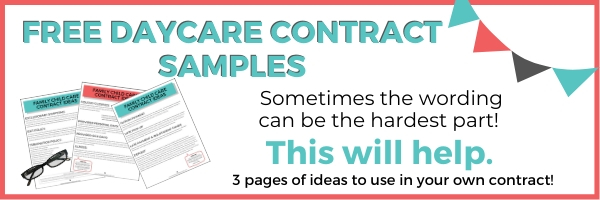
What should be included in a daycare contract?
Every person who runs their own child care business should strive to have a clear, concise and thorough contract. Here are some of things that should be included in your contract:
(Note: This is in not to be considered legal advice or a fully comprehensive list. Be sure to consult your child care licensor on what is required in your contract.)
- The Name of Your Business (Your First & Last Name if you don’t have a business name)
- Your Name & The Name of Your Clients
- The Name of the Child
- The Business Address
- The Business Phone Number
- Website and/or Email (if applicable)
- Hours of Business
- Child Care Rate and Frequency (i.e. per hour, per day, per week)
- Extra fees (deposit. enrollment fee, supply fee, etc)
- Payment Process (how to pay, when payment is due)
- Late Payment Fees
- Payment Policy if Child is Absent
- Exit Notice (Procedure for how this contract ends)
- Termination (under what circumstances will you terminate a family and what is the procedure?)
- Signatures (you and both parents; if available) & Date
What shouldn’t be included in your contract?
Not everything should go in your contract. Save any policies and procedures for a different document. These elements could include information about your curriculum, illness/exclusion procedures, confidentiality, drop-off and pick-up procedures.
Some providers write a separate “Parent Guidebook” to help inform their clients about the remaining ins and outs of their program.
Parent Guidebook for Daycare Sample
A guidebook or handbook can typically be a little longer and more detailed. It’s a great way to outline various procedures, preferences or policies that you would like your clients to know about.
SAMPLE GUIDEBOOK COVER & TABLE OF CONTENTS
As you can see from the Table of Contents sample above, there is a lot of information crammed into my guidebook!
I love how Tom Copeland, family child care business and tax expert explains the difference between a contract & a policy:
Policies are your rules and procedures telling parents how you will care for their children. Your policies can cover a broad range of topics – curriculum, discipline, transportation, activities, and so on.
You can’t take a parent to court for violating your policies, but you can for violating your contract. Therefore, I recommend that you create two separate documents: your contract and your policies. This will give you more flexibility in enforcing them. Read more here…
Tom Copeland
Examples of Policies to Put in a Parent Guidebook
- Illness Policy/Exclusion Guidelines (When should a child be kept home due to illness? When may they return?)
- Drop-Off & Pick Up Procedure (Where should pick-up take place? Parking, etc)
- Late Pick-Up Fee (What will you charge if a parent is late picking up their child? How does the parent pay the fee?)
- Vacation Days/Personal Days/Sick Days (Give the number of days as well as any scheduled days. Also note the amount of notice you will give when taking time off.)
- Smoking Policy (Is it allowed?)
- Medication Policy
- Enrollment Process (timeline, what is required, is there a deposit?)
- Transportation Policy
- Potty Training
- Nap Time
- Behavior Guidance
What is a good length for a daycare contract?
Let’s get back to talking about your contract.
In my opinion, an effective contract is no more than 4 pages. In other words, 2 pages that are 2-sided that also include space for both you and the client to sign.
If and when a contract becomes too lengthy, you run the risk of your clients not reading it thoroughly. The goal is to make sure each client is informed of each element when they sign the contract.
I know I’m guilty of scrolling down quickly past paragraph after paragraph of details when I have to check the little “I agree” box online. I hardly EVER read it. This is because it’s too lengthy, I don’t have time and most of the legal verbiage is over my head.
You do not want this happening with your contract. It is the backbone of your business.
Writing a contract can be stressful for some providers
Many providers express concern that their contract is “too harsh”. They worry it will make them seem strict or mean.
If you can relate to these woes, take comfort in knowing that your contract shouldn’t represent the cozy, loving, warm part of your business. Those qualities of your program are shown through YOU. Not the document that will keep your business running smoothly.
A solid contract is written objectively. There should be little room for misinterpretation; with each element written as clearly as possible.
A home daycare contract isn’t suppose to be sweet and bubbly. It’s not covered in finger paint and glitter (although, I suppose life would be more fun if it were…)
Common Mistakes Family Child Care Providers Make When Writing a Contract
If you’re just starting out in this profession, try the following strategies when developing your child care policies.
- Consult an experienced provider. Have them read your contract or ask to read theirs. Most providers add elements to their contract over time based on issues they have had with past clients. Use this experience to your benefit!
- Talk to your licensor. They can make sure you have included all of the required elements in your contract.
- Ask a close friend or family member to proofread your contract. Preferably anyone who has young children. Tell them to notify you of any policies that sound confusing.

Newsflash! Your first family child care contract won’t be perfect.
In fact, in a few years you’ll look back on your first draft and chuckle a bit. My first contract was a bit of a mess. It was the voice of all of the other providers I had consulted and not my own.
It’s okay.
This is totally normal.
Know that your family child care contract is a document that will develop and improve over time. You will have experiences that will change how you word a certain policy or cover you from the same thing happening again.
Take a peek at a few policies and procedures I have written over the years. There may be a few bits and pieces from the policies in these samples that you feel you should add to yours.
DECIDE WHICH CHILD CARE POLICIES ARE NON-NEGOTIABLE

Here’s where you, the business owner, get to do a little soul searching.
As a family child care provider, you will need to be flexible.
Rules aren’t made to be broken, but there will be times you find yourself making an exception for a client. When you are working with clients who are respectful and who consistently strive to follow your policies, being flexible feels natural. It’s when a client ignores your policies and is constantly asking to bend the rules that you feel overwhelm or even taken advantage of.
The following approach really helped me over the years. Ask yourself, “Which 3 policies, when adhered to by my clients at all times, will help my program flourish?”
When I ask providers this question, often times I hear the same answers and they are as follows:
- Wellness Policy
- Business Hours
- Payment Policy
I’ve gotta say…those three policies were the meat and potatoes of my contract as well. For obvious reasons:
- Wellness Policy – You need to keep the kids in your program as healthy as possible. This means telling families when they need to keep their ill child at home to prevent the spread of illness.
- Business Hours – You want your clients to pick up their child on time so you have a predictable schedule.
- Payment Policy – You want to be paid on time and for the correct amount.
Truth: Many providers would rather crawl into a tub of snakes than confront a client who repeated violates a policy.
I hear providers express great frustration because their clients ignore their contract and they have no idea how to tighten the reigns on the policies that were originally put in place without sound “mean”.
HOW TAKE ACTION ON YOUR MOST IMPORTANT POLICIES
Once you figure out which three policies are most critical to your business running smoothly try this:
- Be proactive, and give extra attention to these key policies during the interview process.
- Encourage your clients to ask questions about these policies.
- Print these 3 policies on a separate sheet of paper and have your client initial next to each one.
- Highlight these policies often in your newsletter.
How to Renew Your Daycare contract
It is a good idea to renew your family child care contract annually.
It will allow you to:
- Review your policies with your existing clients.
- Update your contract with any changes you deem necessary.
- Implement a raise for yourself whether it be in the form of a salary bump (increasing tuition prices) or adding a paid time off day to your calendar.
Edit your contract with any changes you may have and print a copy for your client. Highlighting the changes is a good idea, that way there are less surprises.
Make sure both parents (if available) and you sign and date it. Make a copy to give to your client.
When is the best time to renew your contract?
Some providers choose to renew their contracts on January 1st of each year, while others prefer to update the paperwork in conjunction with the school year calendar (i.e. August or September).

- January – This method is helpful because it will align with your tax year. It’s a new year; a time for a fresh start with a new contract and a renewed signature by all parties.
- August or September – Even if your program doesn’t follow a school year calendar, parents are already sifting through paperwork from the school and can sit down and review all documents for each child in the household.
Food for thought: I preferred the August/September method because it allowed me to avoid having to dish out paperwork during December, which can be a busy (and expensive) month due to the holidays.
In addition, I typically handed out W-10 tax forms in January which detailed the total amount of child care expenses a client had paid in the previous year.
Sometimes the timing of these two documents felt a little wonky… one said, “Hey! Look how much you paid in child care last year!” and the other said, “Now I’m asking you to pay me even more with this tuition increase!”
While there was absolutely nothing wrong with giving myself a raise, I learned that I didn’t enjoy handling the two topics simultaneously.
HOW TO GET YOUR CLIENTS TO READ YOUR CONTRACT

Let’s face it.
How many of us scan documents from the doctor, dentist, or school, barely reading a full sentence before we start signing away?
We know we trust the professional who is giving us the paperwork. What reason would they have to mislead us?
We reflexively begin firing off our initials or penning our signature with the speed of light; not fully reading the material in front of us…
Does this sound familiar?
Chances are, some of your clients will be tempted to do the same.
Your clients loathe paperwork just as much as you do and want the process to be over with quickly so they begin signing the documents without reading the policies.
5 WAYS TO GET YOUR CLIENTS TO READ YOUR DAYCARE CONTRACT
- Deliver your contract with a snack! I used to call mine ‘Popcorn & Paperwork’ and would deliver the folder of renewal papers with a store bought bag of popped popcorn. One year I called it ‘Peanuts & Paperwork’ and each family received a small package of trail mix to munch on as they completed this annual task.
- Offer an I SPY coupon! Intentionally include 1 or 2 typos or silly sentences hidden within the documents. Announce that you will be giving a $10 tuition coupon to each family who finds the typos. Be sneaky with it. Families will be looking over your contract with a fine tooth comb to earn the coupon.
- Include a crossword puzzle. There are some really great online freebie tools that allow you to customize a crossword puzzle! Your clues should be the descriptors of various elements of your contract. Families will need to use the details in the contract to help solve the crossword puzzle. Offer an incentive for families who submit the completed activity to you.
- Use a highlighter. Highlight areas they need to initial or sign with a highlighter before giving them the documents. You could also include a separate sheet that lists each policy with one or two key words and the client can initial on the blank line next to each policy. (i.e. ____ Wellness Policy)
- Prepare your readers. Share the announcement regarding the upcoming paperwork renewal in your newsletter or in an email. Stress how important it is for them to read through the materials thoroughly. Invite them to call or email you with any questions they may have and thank them for their continued support.
ADDITIONAL RESOURCES FOR CHILD CARE POLICY SAMPLES AND IDEAS
For other great resources on writing a family child care contract, check out Tom Copeland’s website filled with many articles on this topic. Mr. Copeland has been a trainer, author and advocate for the business of family child care since 1981 and has taught me so much regarding the business side of family child care.
In his article, The Basics of a Family Child Care Contract, Mr. Copeland says:

He’s absolutely correct.
Your contract is a document that is signed by both parties and highlights important elements of your program that will allow you to be a successful business owner with a solid framework of how the program will operate.
If you’ve spent any amount of time with young children, you know they are happier when given clear expectations and solid boundaries. The same goes for the provider and client business relationship.
When a client thoroughly understands the expectations set forth by the provider, the partnership will be one that is built on respect.
Free Home Daycare Contract Template PDF
A few examples can really help you get an idea for what you want to write in your own contract.

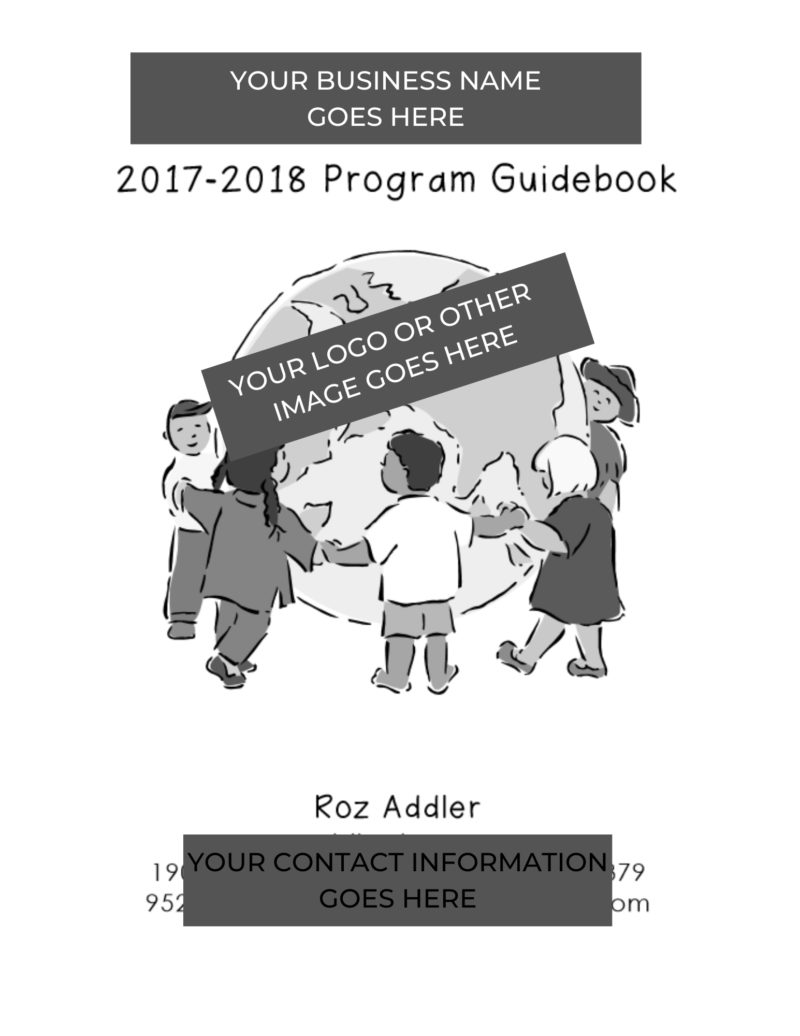
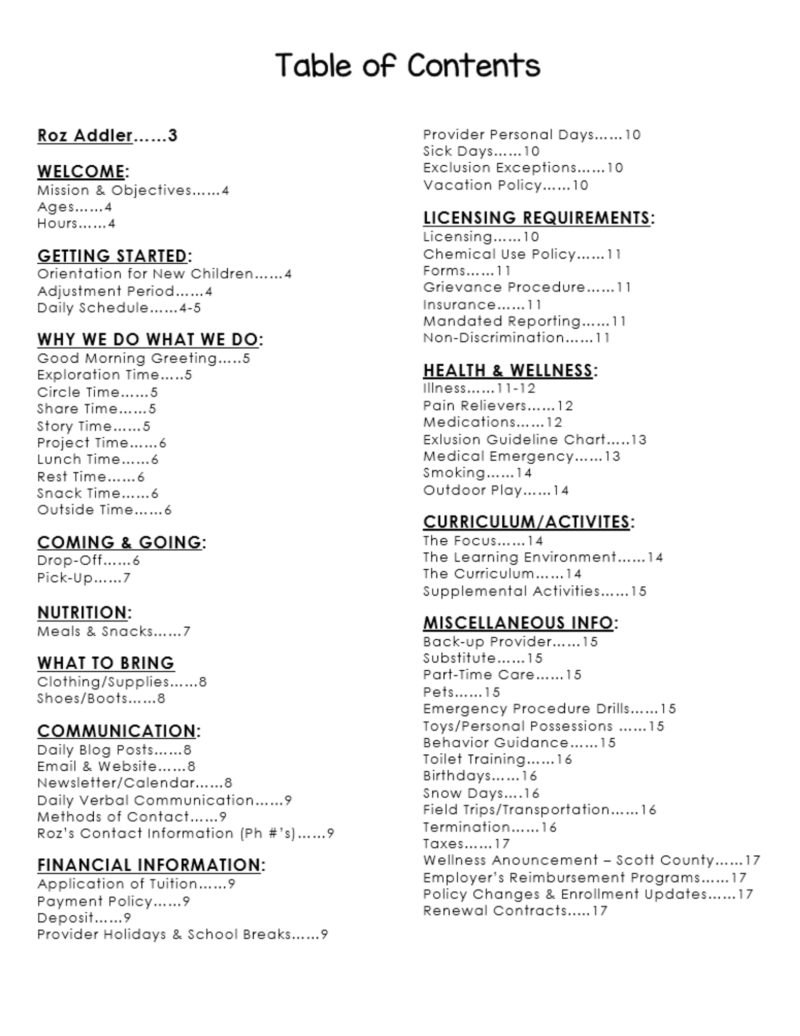
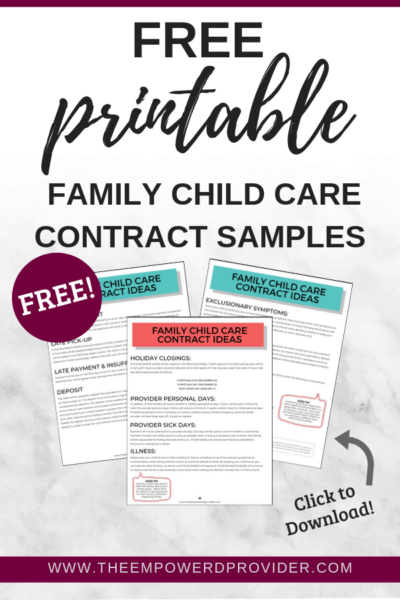

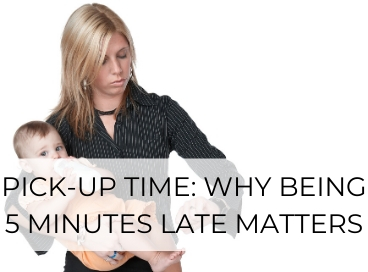
 Hey there! I hold the work of early childhood educators (my title for family child care providers) in the highest regard! If you are looking for ways to better your business or to find inspiration to bring joy and meaning to your classroom, then you've come to the right place! Click here to read more!
Hey there! I hold the work of early childhood educators (my title for family child care providers) in the highest regard! If you are looking for ways to better your business or to find inspiration to bring joy and meaning to your classroom, then you've come to the right place! Click here to read more!
Leave a Reply